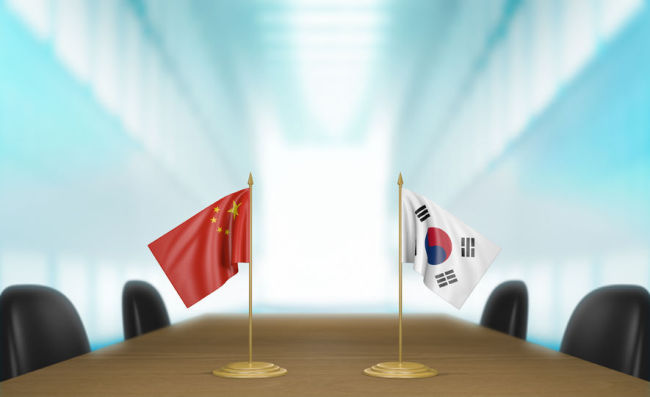South Korean corporations are scrambling to find ways to contain or reduce growing risks posed by China to their business in the world’s second-largest economy.

They have found themselves bearing the brunt of Beijing’s anger at Seoul’s agreement in July to deploy an advanced US missile defense system here to protect against nuclear and missile threats from North Korea.
While refraining from taking outright retaliatory measures, China has heightened nontariff barriers and increased other restraints on South Korean companies operating in the country.
China accounted for more than half of 49 nontariff measures against Korean products in force abroad as of October, according to the Korea International Trade Association.
In recent weeks, Chinese authorities have excluded vehicles equipped with Korea-made batteries from receiving subsidiaries, banned imports of many Korean cosmetic products and rejected Korean airlines’ requests to fly chartered flights between the two countries in time for the Lunar New Year holiday.
In what could be viewed as Beijing’s latest retaliatory move, China’s Commerce Ministry last week decided to extend its anti-dumping duties on Korean optical fibers by five years starting from Jan. 1.
China has ignored caution that mixing trade and security issues would eventually do the worst damage to its own economy.
During a visit to Seoul late last year, a Chinese Foreign Ministry official warned Korean corporate executives that their businesses in China would suffer, if the missile defense shield, which Beijing sees as undermining its own strategic security interest, was deployed here as planned.
Seoul officials recently said they are working on countermeasures against China’s retaliatory action, which is likely to intensify in the months to come.
Many experts here, however, remain skeptical that the government has any effective options at its disposal. Any countermeasure might backfire and it would not be easy for Seoul to seek solutions through the process of the World Trade Organization due to a lack of clear evidence of the Chinese government’s direct involvement.
During bilateral trade talks in Beijing last week, Chinese officials rebuffed concerns raised by their South Korean counterparts over China’s retaliatory steps in connection with the planned deployment of the missile defense system.
“There seems to be nothing the government can do right now,” said Lee Heui-ok, head of the Sungkyun Institute of China Studies affiliated with Sungkyunkwan University in Seoul.
Set up as a target for Beijing’s direct threats in its attempt to change Seoul’s security policy, Korean corporations are stepping up efforts to be less exposed to risks from China.
More Korean companies have moved production facilities out of China to third countries such as Vietnam and have made more shipments to China via Hong Kong, where customs procedures are more transparent.
According to data from the Ministry of Trade, Industry and Energy, Korea’s exports to Vietnam soared 17.6 percent from a year earlier last year, while its shipments to China fell 9.2 percent. Accordingly, China’s share of Korea’s total exports decreased from 26 percent to 25.1 percent over the cited period, with the figure for Vietnam rising from 5.3 percent to 6.5 percent.

Samsung Display plans to make an additional investment of 3 trillion won ($2.54 billion) in Vietnam to boost capacity. LG Display and LG Innoteck last year unveiled plans to invest $1.5 billion and $550 million, respectively, in the Southeast Asian country.
Shipments of Korean goods to Hong Kong increased 7.2 percent on-year last year, with Hong Kong’s share of Korean exports rising from 5.8 percent to 6.6 percent over the cited period. This means Korean companies are more active in taking Hong Kong as a detour to the Chinese market, given about 80 percent of shipments to the territory is sent to mainland China, experts said.
Rising risks from China are also expected to prompt local rival companies to forge business alliances.
In a move that heightened such a possibility, LG Display has agreed to provide Samsung Electronics with liquid crystal display panels for televisions under conditions to be decided on within the first half of this year, industry sources said.
Taiwan’s Hon Hai Precision Industry and its Japanese subsidiary Sharp last year announced the suspension of the supply of LCD panels to Samsung. A joint venture between Hon Hai and Sharp had accounted for about 10 percent of panels for Samsung’s large-screen televisions.
Samsung is also considering using batteries made by LG Chem in its new smartphone models, according to industry sources.
“Cooperation between Samsung and LG would set up a good precedent for other local companies,” said Lee Jang-kyun, a researcher at the Hyundai Research Institute, a private think tank.
Experts said Korean companies need to brace themselves for not only retaliatory measures taken by Beijing against the deployment of the missile defense shield, but also more fundamental and far-reaching risks posed by China’s economic slowdown and changes in its industrial supply chain.
If China’s growth rate falls by 1 percent over the period from 2015 through 2020, it would lead to a reduction in Korea’s economic expansion by 0.26 percent, according to estimates by the Asian Development Bank.
Beijing’s policy to substitute imported intermediary goods with domestic products is set to further weigh on Korea’s exports to China.
Experts advise Korean corporations to strengthen efforts to export more consumer goods to China and diversify overseas markets for their products.
By Kim Kyung-ho (khkim@heraldcorp.com)
-
Articles by Korea Herald



















![[Today’s K-pop] Treasure to publish magazine for debut anniversary](http://res.heraldm.com/phpwas/restmb_idxmake.php?idx=642&simg=/content/image/2024/07/26/20240726050551_0.jpg&u=)